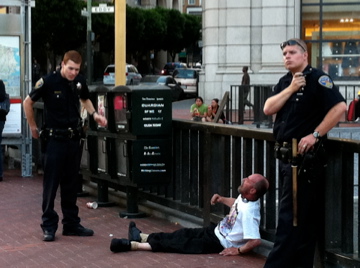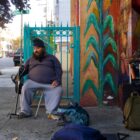Homeless people in San Francisco, much more than the other city residents, find themselves at the wrong place at the wrong time, getting ticketed or arrested for any of more than 20 minor offenses. The city’s chronic low-level harassment of people living on the streets and in shelters amounts to a mass violation of civil rights, say advocates organizing an international day of action.
San Francisco is not unique in enforcing what are often known as “quality of life crimes.”
Two North American networks of homeless advocacy organizations — the San Francisco-based Western Regional Advocacy Project and the USA-Canada Alliance of Inhabitants, in Dowelltown, Tenn. — hope to bring attention to what they call the “criminalization of homelessness.” They assert a that the homeless have a “right to exist” in public spaces.
“Crime statistics nationally now include millions of homeless people who were sitting, lying down, hanging out and — perhaps worst of all — sleeping,” said Paul Boden, director of the advocacy project.
The groups together are organizing public rallies and direct action in 15 cities in the U.S. and Canada. San Francisco activists are gathering at Union Square at 2 p.m. Sunday. They chose the location because businesses increasingly are focused on sweeping homeless people away from the area, in favor of tourists and window-shoppers.
In a recent study, the National Law Center on Homelessness & Poverty in Washington, D.C., found police in 234 U.S. cities employ similar strategies.
Most of San Francisco’s ordinances have prohibitions specific to time or place. A 2011 San Francisco law restricted public behavior at two plazas in the Castro District. A 2010 voter initiative banned sitting or lying on sidewalks within a 16-hour time period.










